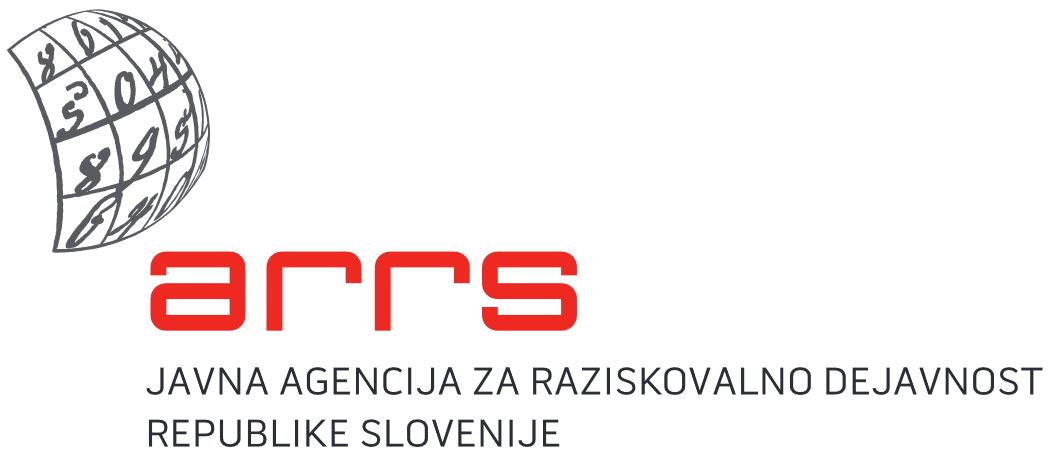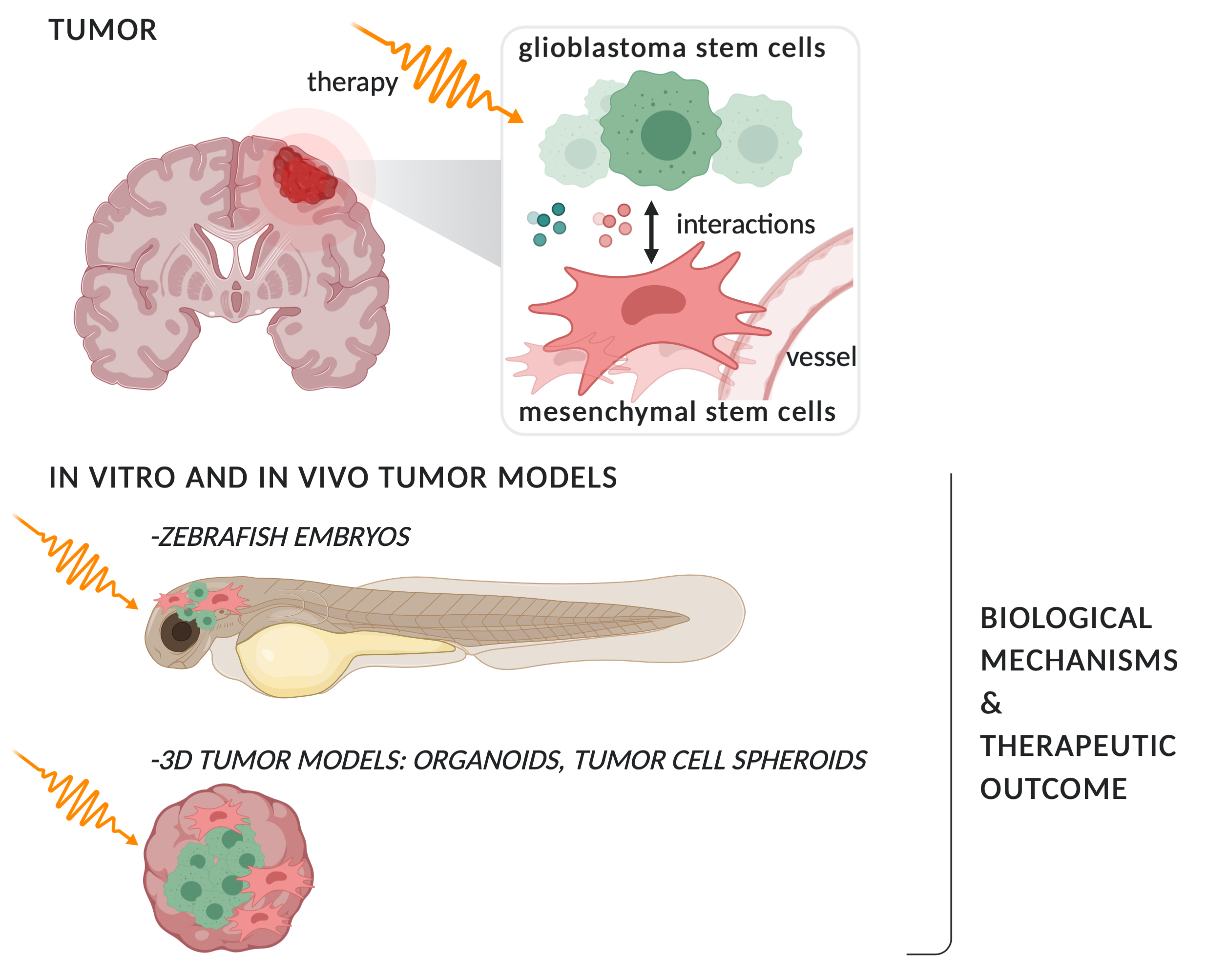Projects
Biotechnological Hub of the NIB (BTH-NIB)
The purpose of the investment project BTH-NIB is the assurance of the appropriate infrastructural conditions for the use of research and developmental opportunities in the fields of operation of the NIB.
Play Video About project Publication
The impact of mesenchymal stem cells on glioblastoma therapeutic resistance
Project coordinator: Barbara Breznik, PhD
Code: Z3-1870
Duration: 1.7.2019 – 30.6.2021
Postdoctoral project Z3-1870 is financially supported by Slovenian Research Agency.
Brain tumor glioblastoma remain one of the most aggressive malignancy, with no change in the standard treatment for almost 20 years. Standard therapy may reduce the tumor in size, make it even too small to detect, and contain the disease for a few months by killing susceptible cells, but the surviving cells are therapy resistant. This resistant subpopulation of glioblastoma cells in tumors have characteristic expression of stem cell-related genes and are named glioblastoma stem cells (GSCs). GSCs are slowly-dividing cells expressing DNA repair mechanisms and multidrug resistance mechanisms that enable survival of GSCs after radio- and chemotherapy causing regrowth of the tumor. In vivo, the GSC state is tightly regulated by the GSC microenvironment, named GSC niches. There is increasing evidence of a key role of complex interactions between cancer cell and non-cancerous stromal cells in glioblastoma therapy resistance, in particular in GSC niches, where mesenchymal stem/stromal cells (MSCs) are comprising a significant fraction of the cell types present. However, the effects of specific stromal cells, such as MSCs, on the GSC phenotype have been poorly investigated in comparison with other types of stromal cells.
Objectives
Objectives of the research project are to reveal new mechanisms of glioblastoma therapeutic resistance and specifically to elucidate the role of interactions between mesenchymal stem cells (MSCs) and glioblastoma stem cells (GSCs) in tumors. The specific aims are:
1) to determine whether MSCs as a cellular component of patient-derived organotypic multicellular spheroids are associated with GSC and glioblastoma cell responses to treatment and patient outcome,
2) to compare the responses to therapy between patient-derived GSCs alone and GSCs in co-cultures with MSCs in in vitro and in vivo models, and
3) to elucidate mechanisms of MSC-altered GSC responses to treatment by analyzing cellular processes and phenotype changes.
We will provide novel information if MSCs, as “good” or “bad guys” in glioblastoma progression after standard treatment.
Relevance and potential impact of results
The proposed project addresses the problem of glioblastoma therapy resistance that results in tumor recurrence and early death of patients. The findings obtained in the proposed research project will thus deepen our understanding of glioblastoma pathobiology and will give novel insights into complex mechanisms of glioblastoma treatment resistance. Consequently, our findings will provide a basis for further innovative approaches to target glioblastoma stem cells successfully in glioblastoma tumors.
Project official webpage: http://projects.nib.si/gliostemcell/
Project SICRIS
Principal investigator SICRIS

Brain tumor glioblastoma remain one of the most aggressive malignancy, with no change in the standard treatment for almost 20 years. Standard therapy may reduce the tumor in size, make it even too small to detect, and contain the disease for a few months by killing susceptible cells, but the surviving cells are therapy resistant. This resistant subpopulation of glioblastoma cells in tumors have characteristic expression of stem cell-related genes and are named glioblastoma stem cells (GSCs). GSCs are slowly-dividing cells expressing DNA repair mechanisms and multidrug resistance mechanisms that enable survival of GSCs after radio- and chemotherapy causing regrowth of the tumor. In vivo, the GSC state is tightly regulated by the GSC microenvironment, named GSC niches. There is increasing evidence of a key role of complex interactions between cancer cell and non-cancerous stromal cells in glioblastoma therapy resistance, in particular in GSC niches, where mesenchymal stem/stromal cells (MSCs) are comprising a significant fraction of the cell types present. However, the effects of specific stromal cells, such as MSCs, on the GSC phenotype have been poorly investigated in comparison with other types of stromal cells.
Objectives
Objectives of the research project are to reveal new mechanisms of glioblastoma therapeutic resistance and specifically to elucidate the role of interactions between mesenchymal stem cells (MSCs) and glioblastoma stem cells (GSCs) in tumors. The specific aims are:
1) to determine whether MSCs as a cellular component of patient-derived organotypic multicellular spheroids are associated with GSC and glioblastoma cell responses to treatment and patient outcome,
2) to compare the responses to therapy between patient-derived GSCs alone and GSCs in co-cultures with MSCs in in vitro and in vivo models, and
3) to elucidate mechanisms of MSC-altered GSC responses to treatment by analyzing cellular processes and phenotype changes.
We will provide novel information if MSCs, as “good” or “bad guys” in glioblastoma progression after standard treatment.
Relevance and potential impact of results
The proposed project addresses the problem of glioblastoma therapy resistance that results in tumor recurrence and early death of patients. The findings obtained in the proposed research project will thus deepen our understanding of glioblastoma pathobiology and will give novel insights into complex mechanisms of glioblastoma treatment resistance. Consequently, our findings will provide a basis for further innovative approaches to target glioblastoma stem cells successfully in glioblastoma tumors.
Project official webpage: http://projects.nib.si/gliostemcell/
Project SICRIS
Principal investigator SICRIS



 Scope of NIB's accreditation is given in the Annex to the accreditation certificate and in the List of accredited methods for detection of GMOs and microorganisms – plant pathogens
Scope of NIB's accreditation is given in the Annex to the accreditation certificate and in the List of accredited methods for detection of GMOs and microorganisms – plant pathogens Holder of National Standard in the Field of Amount of Substance/Bioanalysis of Nucleic Acids/GMOs and Microorganisms
© 2023- National institute of biology, all rights reserved

